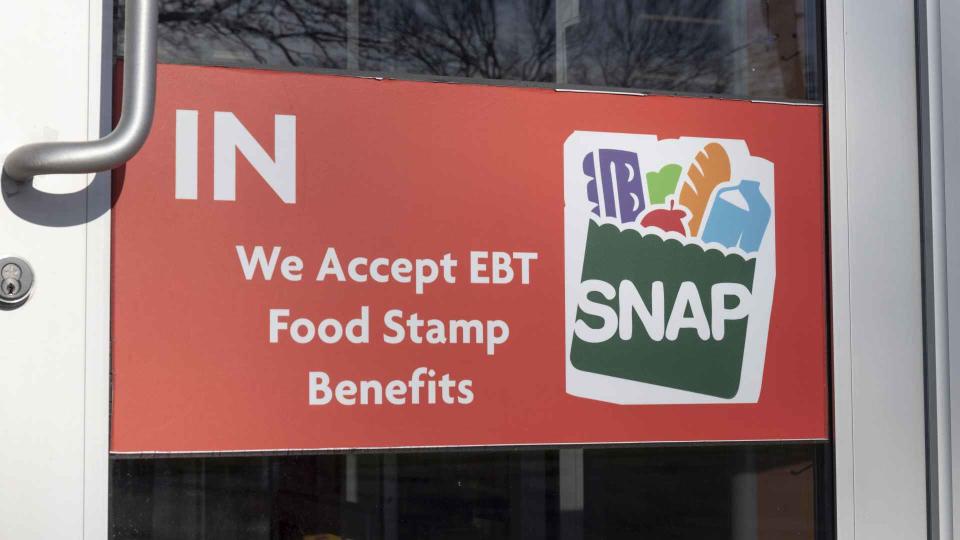Food Stamps: Veterans Are Less Likely To Apply for SNAP Benefits — 4 Reasons They Shouldn’t Be

Across every state, thousands of low-income veterans use SNAP, formerly food stamps, to stretch their grocery budgets. However, many veterans are resistant to SNAP and don’t get the help they need.
Food Stamps: What is the Highest Income Level for SNAP Payments in 2023?
Find: What Income Is Considered Poverty Level in 2023?
“Some are too prideful and some don’t want to go that route,” Carl Davis, a veteran with a 100% disability rating from Veterans Affairs for service-related injuries, said to The War Horse. And others may not qualify. The War Horse noted that the VA benefits Davis receives count as income and make him ineligible.
Davis turned to the Feed Our Vets food pantry, a veteran-founded food pantry, near his home in upstate New York when he and his longtime partner struggled to put food on the table for their three kids.
As many as 18 million U.S. adults are veterans, according to the National Council on Aging, and many are over the age of 65, live with a disability or fall under both categories. Age and disability can lead to income-related hardships, but veterans are still less likely to apply for SNAP benefits.
Here are some reasons why low-income veterans should learn more about food assistance programs and apply for SNAP benefits.
Veterans Face a High Risk for Food Insecurity
Food insecurity, which is the inability to secure food to maintain good health, can push people to rely on cheap, unhealthy foods, The War Horse reported.
A recent RAND report showed that veteran status was associated with a 7.4% increased likelihood of living in a household with food insecurity and a 9.2% increased likelihood of being very food insecure and regularly skipping meals. Among food-insecure veterans aged 70 and older, only 29% were likely enrolled in SNAP, compared with 39% of their nonveteran counterparts.
Also: 8 Frugal Habits of the Past To Save Money Today
Food Insecurity Is Bad for Your Health
In a 2020 congressional hearing, Dr. Thomas O’Toole, who was then the Veterans Health Administration senior medical adviser, said research showed a link between lacking regular access to food and “poorly controlled hypertension, diabetes, HIV disease, asthma, depression, anxiety,” he said, as reported by The War Horse.
Among older adults, it’s also associated with reduced activities of daily living and being over two times more likely to report poor health.
There’s a Link Between Food Insecurity and Suicide
There’s also a connection between food insecurity and suicide ideation. The War Horse reported that in a survey of more than 1,000 randomly chosen post-9/11 veterans across all branches, those who reported food insecurity had nearly four times higher levels of suicidal ideation when surveyed one year later than veterans who had regular access to food.
In 2020, 6,146 veterans died by suicide, according to the most recent National Veteran Suicide Report and as reported by The War Horse — a rate 57% higher than nonveterans.
You Don’t Have to Apply in Person
Tamara Dubowitz, senior policy researcher at RAND and one of the report’s authors, noted that when analyzing state SNAP policies, they found a few associated with higher rates of SNAP enrollment for veterans and nonveterans. One included a combined application program, which automatically enrolls someone in SNAP if they apply for a federal benefit.
Dubowitz told The War Horse that if you live in a state with policies in place to simplify the application process, it helps. Veterans are also more likely to enroll when they apply by phone or online rather than in person.
More From GOBankingRates
Suze Orman: 3 Things You Must Do If You Receive an Inheritance
Experts: Here's Why Nearly Every Purchase Should Be On a Credit Card
This article originally appeared on GOBankingRates.com: Food Stamps: Veterans Are Less Likely To Apply for SNAP Benefits — 4 Reasons They Shouldn’t Be

 Yahoo Finance
Yahoo Finance 